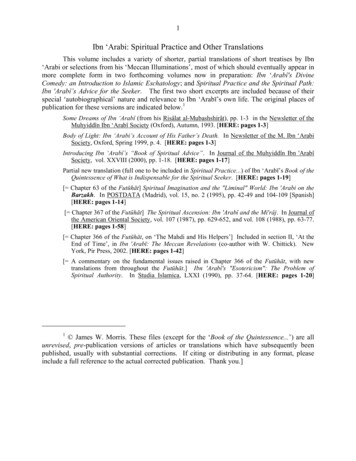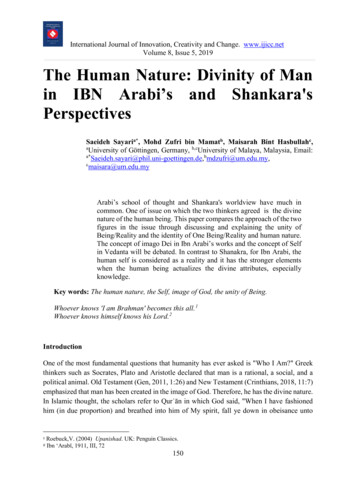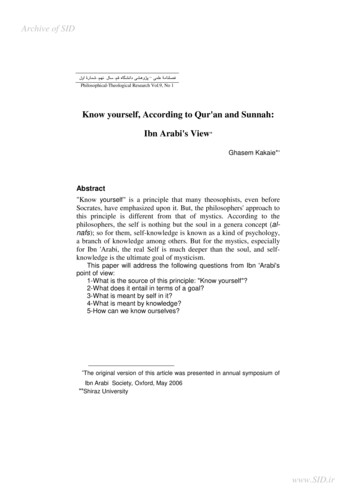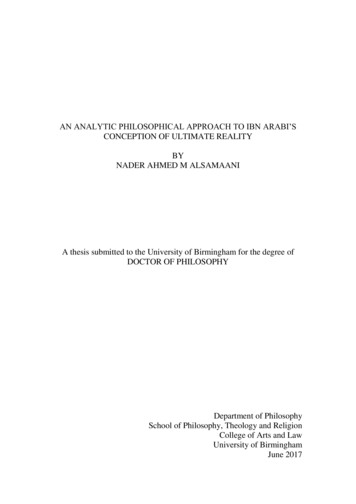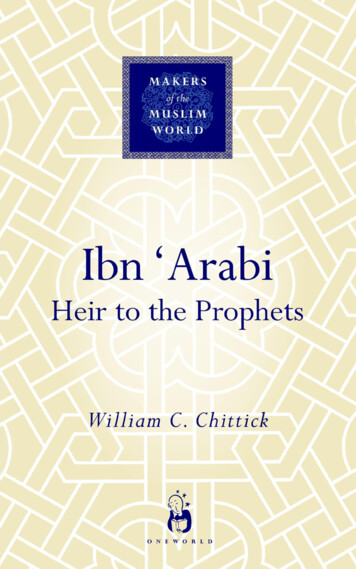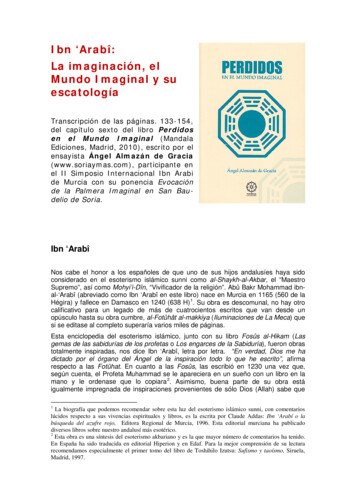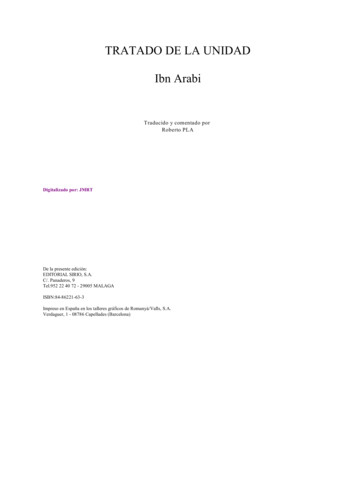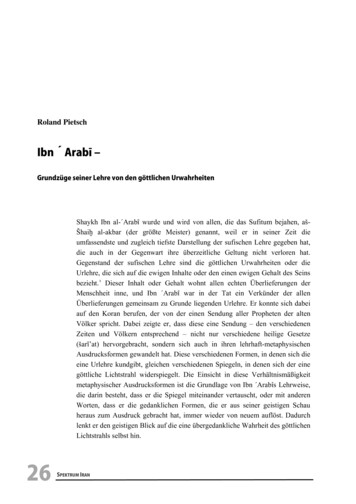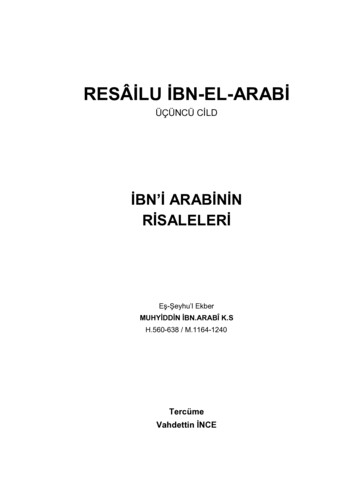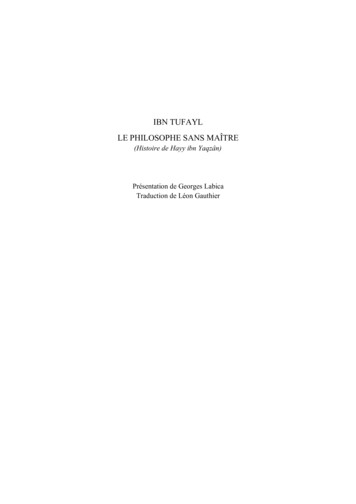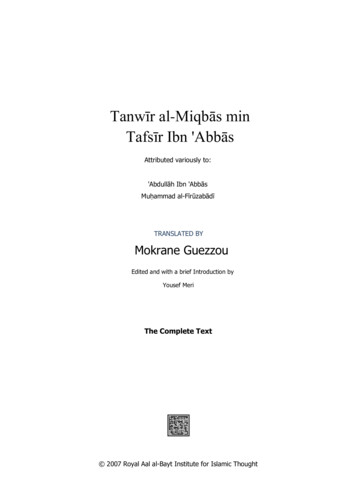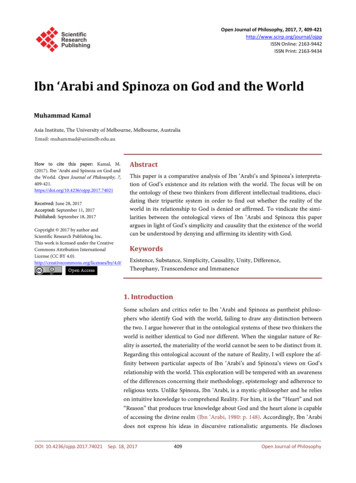
Transcription
Open Journal of Philosophy, 2017, 7, 409-421http://www.scirp.org/journal/ojppISSN Online: 2163-9442ISSN Print: 2163-9434Ibn ‘Arabi and Spinoza on God and the WorldMuhammad KamalAsia Institute, The University of Melbourne, Melbourne, AustraliaHow to cite this paper: Kamal, M.(2017). Ibn ‘Arabi and Spinoza on God andthe World. Open Journal of Philosophy, eceived: June 28, 2017Accepted: September 11, 2017Published: September 18, 2017Copyright 2017 by author andScientific Research Publishing Inc.This work is licensed under the CreativeCommons Attribution InternationalLicense (CC BY en AccessAbstractThis paper is a comparative analysis of Ibn ‘Arabi’s and Spinoza’s interpretation of God’s existence and its relation with the world. The focus will be onthe ontology of these two thinkers from different intellectual traditions, elucidating their tripartite system in order to find out whether the reality of theworld in its relationship to God is denied or affirmed. To vindicate the similarities between the ontological views of Ibn ‘Arabi and Spinoza this paperargues in light of God’s simplicity and causality that the existence of the worldcan be understood by denying and affirming its identity with God.KeywordsExistence, Substance, Simplicity, Causality, Unity, Difference,Theophany, Transcendence and Immanence1. IntroductionSome scholars and critics refer to Ibn ‘Arabi and Spinoza as pantheist philosophers who identify God with the world, failing to draw any distinction betweenthe two. I argue however that in the ontological systems of these two thinkers theworld is neither identical to God nor different. When the singular nature of Reality is asserted, the materiality of the world cannot be seen to be distinct from it.Regarding this ontological account of the nature of Reality, I will explore the affinity between particular aspects of Ibn ‘Arabi’s and Spinoza’s views on God’srelationship with the world. This exploration will be tempered with an awarenessof the differences concerning their methodology, epistemology and adherence toreligious texts. Unlike Spinoza, Ibn ‘Arabi, is a mystic-philosopher and he relieson intuitive knowledge to comprehend Reality. For him, it is the “Heart” and not“Reason” that produces true knowledge about God and the heart alone is capableof accessing the divine realm (Ibn ‘Arabi, 1980: p. 148). Accordingly, Ibn ‘Arabidoes not express his ideas in discursive rationalistic arguments. He disclosesDOI: 10.4236/ojpp.2017.74021 Sep. 18, 2017409Open Journal of Philosophy
M. Kamalthem in mystic experiences. When Ibn Rushd, a Peripatetic Muslim philosopher,met Ibn ‘Arabi and was told about his spiritual experience, Ibn Rushd commented on Ibn ‘Arabi’s spiritual experience saying that “this is a state that wehad confirmed rationally, but we had never seen anyone who possessed it”(Chittick, 1989: p. xiv). Henry Corbin also confirms Ibn ‘Arabi’s encounter withIbn Rushd and cites him saying that “such a thing was possible, but [he had]never met anyone who had actually experienced it” (Corbin, 1981: p. 42). Bycontrast, Spinoza is a rationalist thinker, relying on “reason” for knowing Realityand using the geometrical method in his Ethics for justifying his ideas. Ibn ‘Arabi often employs the terminology of theologians to describe the nature andattributes of God, and supports his views by quoting from the Qur’an, whereasSpinoza minimises the use of theological terms and does not refer to a religioustext for reinforcing his arguments.2. God’s Simplicity and CausalityFrom the outset it is necessary to understand that for both thinkers there is asingle ontological reality upon which everything stands. In Ibn ‘Arabi’s ontology,this single reality is called “Existence” and for Spinoza it is “Substance”. The twodifferent terms are employed to signify the same reality, as both terms refer toGod. The existence of Godas the only reality, is therefore a common ground forthem. It is this claim about the existence of a single ontological reality that hasled scholars to call Ibn ‘Arabi the founder of the doctrine of the Unity of Exis-tence (wahdat al-wujȗd), and Spinoza a pantheist philosopher. But neither Ibn‘Arabi nor Spinoza used these terms to describe their doctrines, and the term“Pantheism” suggests a somewhat simplified version of their respective ontologies. It is also possible to argue that Ibn ‘Arabi, like Spinoza, accepts the reality ofa single “substance” as he rejects individual substances as advocated by Aristotleand some Muslim theologians. According to him, all individual substances aremere accidents and effects rather than substances. God who is a self-caused being and immutable, can only be defined as substance. All existing entities whichare called substances by Aristotle and some theologians, are not different fromaccidents in being caused and in constant change (Chittick, 1989: p. 97). Theterm wahdat al-wujȗd, which describes Ibn ‘Arabi’s ontological position, wascoined after him. It was taken up by his opponents, particularly the orthodoxtheologians Ibn ‘Abd al-Salam al-Sulami (d. 1262) and his contemporary thejurist Ibn Taymiyya, (d. 1328). The former declared Ibn ‘Arabi “a master of evil”(Knysh, 1999: p. 66) and the latter branded the doctrine of the Unity of Existence heretical or atheism (Knysh, 1999: p. 94). Ibn Taymiyya stated also that inIbn ‘Arabi’s philosophy, the world is identical to God’s existence and both wereseeing as eternal and such belief surpassed in unbelief. Not surprisingly, the dispute around Ibn ‘Arabi’s ontology has led to conflicting views. Some scholarshave agreed that the term “Pantheism” is rightly applied to Ibn ‘Arabi’s ontology, while others find it inadequate. Abul Ela Affifi, whose contribution to theDOI: 10.4236/ojpp.2017.74021410Open Journal of Philosophy
M. Kamalstudy of Ibn ‘Arabi’s thought is significant, has no hesitation in employing theterm “Pantheism” to describe Ibn ‘Arabi’s ontology (Netton, 1980: p. 272). Others, such as Hussein Nasr and Chittick do not favour the term “pantheism” andinsist that it should not be attributed to the doctrine of the Unity of Existence(Chittick, 1989: p. 79). Comparable controversy surrounds Spinoza’s ontology.Hegel, in his lectures on the history of philosophy associates Spinoza’s systemwith absolute pantheism and monism. He also explains how Friedrich HeinrichJacobi identifies Spinoza’s thought even with atheism (Hegel, 1995: p. 282). Bertrand Russell, in interpreting Spinoza’s philosophy, remarks that “although hiswhole philosophy is dominated by the idea of God, the orthodox accused him ofatheism” (Russell, 2000: p. 552). As we know, on July 27, 1656, Spinoza was excommunicated by the Ark in the synagogue of Talmud Torah, the united congregation of the Portuguese Jews in Amsterdam. The document of excommunication, which was written in Portuguese, states;“The chiefs of the council do you to wit, that having long known the evilopinions and works of Baruch de Espinoza, they have endeavoured by diverse ways and promises to withdraw him from evil ways, and they are unable to find a remedy, but on the contrary have had every day more knowledge of the abominable heresies practiced and taught by him.” (Pollock,2005: p. 47)The charge against Ibn ‘Arabi and Spinoza by orthodox theologians is to someextent not speculative or baseless as an interpretation of the existence of Godand its relation with the world by them is in contradiction with the views ofthese theologians. However, the criticism of the orthodox theologians and thechallenges posed by them are connected with the notion of God’s simplicity, Hiscausal relationship with the world and its location, for example, whether God istranscendent or immanent. In defining God as an object of mystic knowledge,Ibn ‘Arabi combines the notions of nondelimitedness, cause and effect, essenceand existence. All these refer to God’s simplicity and causal relationship with theworld. God’s existence as the ultimate reality is limitless and hence remains absolute, but His ontological priority asserts His unity, which makes Hima simplebeing. For this reason God’s essence is not separated from His existence. In TheMeccan Revelations Ibn ‘Arabi writes,“Know that the objects of knowledge (al-ma‘lȗmât) are four. [The first is]God, who is described by Nondelimited Being (al-wujȗd al-mutlaq), for Heis neither the effect (ma‘lȗl) nor the cause (‘illa) of anything. On the contrary, He exists through his essence. Knowledge of Him consists of knowledge that H/he exists, and His existence is not other than His Essence,though His Essence remains unknown; rather, the attributes that are attributed to Him are known, i.e., the Attributes of Meaning (sifât al-ma‘âni),which are the Attributes of Perfection (sifât al-kamâl).” (Ibn ‘Arabi, 1980: p.33)DOI: 10.4236/ojpp.2017.74021411Open Journal of Philosophy
M. KamalThe ontological priority of God follows necessarily from this notion of simplicity because if God is composite and not simple then His existence will presuppose its components, and in this case God cannot become the ultimate ontological reality. The simplicity of God is by no means only a philosophical problem. It has also become central for Muslim theologians in their discussion of thereality and eternity of God’s attributes, particularly between the rationalist andtraditionalist theologians. Unlike the traditionalists, the rationalist theologians,represented by the Mu‘tazilites, denied the reality and eternity of separateattributes in the essence of Goduntil a subtle balance was found by the Ash’aritetheologians who adopted a theological position between orthodoxy and rationalism, between the unity of God and His attributes.For Spinoza whatever is, is either God, His attributes or the modes of Hisattributes. In Ethics, he states, “God or substance consisting of infinite attributes,each of which expresses eternal and infinite essence, necessarily exists” (Spinoza,1970: p. 7). God necessarily exists or is the Necessary Being because His existence and essence are one and the same thing. For, if God’s essence does not involve existence, then God will become composite and cannot have ontologicalpriority of existence. The distinction between existence and essence pertains topossible beings. God as the only substance is not produced from anything elseand His essence must be His existence, “God’s existence and essence are one andthe same thing” (Spinoza, 1970: p. 19). Here, Spinoza, like Ibn ‘Arabi, in order toaffirm the ontological priority of substance he defends the unity and simplicityof God.It is worth mentioning that the simplicity of God in Ibn ‘Arabi’s and Spinoza’sontology, which is based on the denial of any kind of inner dichotomy of Reality,is distinct from the simplicity of the “prime cause” in Aristotle’s metaphysicsand God in the doctrine of the theologians. For Aristotle, God is necessarilysimple otherwise it will not be conceived as the first cause. Its simplicity is amere reduction of its existence into a single element, namely a substance consisting of form without matter (Aristotle, 1995: 1032b1, 30). In the same manner,the simplicity of God’s existence, for the theologians, excludes the materiality ofthe world. The world as something material remains completely different as wellas separate from God. This interpretation of God’s relationship with the worldby the theologians is not different from Aristotle’s doctrine of causation or thegeneration of the world by the prime cause. But Aristotle, unlike the theologians,does not advocate the idea of creation ex nihilo. For him the world as a hylomorphic reality has not come into existence out of nothing. The prime matter(hyle) which constitutes the physical aspect of the world, is neither from Godnor created ex nihilo. For, according to Aristotle, it is not possible for somethingto be produced exnihilo and at the same time the prime matter is not from Godbecause God is pure form. Prime matter, therefore, must have existed eternallywith God, for what is uncreated has no beginning, and for Aristotle, the primematter is uncreated. This metaphysical position however, is in conflict with thedoctrine of creation ex nihilore inforced by the theologians. Nevertheless, forDOI: 10.4236/ojpp.2017.74021412Open Journal of Philosophy
M. KamalAristotle and the theologians, God remains immaterial and His existence doesnot involve matter. Aristotle and these theologians sustain the unity and simplicity of God’s existence by isolating matter from the pure form of God. Ibn‘Arabi and Spinoza oppose this understanding of God’s simplicity because itdoes not include the material aspect of the world. If the material existence of theworld is not contained in God then it should have its own reality distinct fromGod. In this case the idea of God’s unity will be jeopardised. But, what does Ibn‘Arabi mean by defining God as neither the effect nor the cause of anything? Orin what way is God not a transient cause?3. God and the WorldIbn ‘Arabi, in explaining the causal relationship between God and the world,holds the view that everything is God and yet not God, because God is the onlyReality and the ontological foundation of everything that exits. He illuminatesthis ontological position with a statement “He/not He”; signifying that whateveris, is God and yet not God.“The Realty is at once the created Creator and the creating creature. All thisis One Essence, at once Unique and Many, so consider what it is you see.”(Ibn ‘Arabi, 1980: p. 87)The Reality is manifest and unmanifest, the inner and outer. Whatever isfound and experienced constitutes a sensory realm and the appearance of Reality. Similarly, God for Spinoza is “natura naturans”, nature producing nature or acause that produces nature but the caused nature “natura naturata” is not separated from its cause. It is in God a
Ibn ‘Arabi combines the notions of nondelimitedness, cause and effect, essence and existence. All these refer to God’s simplicity and causal relationship with the world. God’s existence as the ultimate reality is limitless and hence remains ab-solute, but His ontological priority asserts His unity, which makes Hima simple being. For this reason God’s essence is not separated from His .
